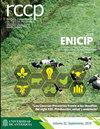Oleoresins from chili pepper and turmeric could substitute for salinomycin in broilers
IF 0.5
4区 农林科学
Q4 AGRICULTURE, DAIRY & ANIMAL SCIENCE
引用次数: 3
Abstract
Background: Coccidiosis is the infectious disease with the greatest economic impact in poultry production. Additionally, chemotherapeutic growth promoters are being substituted for safer alternative strategies. Objective: To evaluate the effect of feeding oleoresins from chili pepper (Capsicum annuum) and turmeric (Curcuma longa L.) on the performance, survival rate, and the Productive Efficiency Index of broilers from 1 to 21d challenged by Eimeria sp. Methods: A total of 700 male 1-dayold chicks (Cobb 500) challenged with Eimeria sp, were assigned to a completely randomized design with four treatments: (1) negative control diet, without anticoccidial agent or growth promoters; (2) control diet+0.05% salinomycin; (3) negative control diet+100g/ton; and (4) negative control diet +140g/ton of test product (Curcuma longa L. plus Capsicum annuum oleoresins). Results: Body weight, weight gain, feed conversion and Productive Efficiency Index did not differ between broilers fed anticoccidial chemotherapeutics and oleoresins. In addition, there was no difference in feed intake and survival rate between dietary treatments. Conclusion: Broilers supplemented with chili pepper and turmeric oleoresins from 1 to 21d present similar body weight, weight gain, feed conversion, and Productive Efficiency Index compared to broilers supplemented with chemotherapeutic anticoccidials without affecting feed intake or survival rate.从辣椒和姜黄中提取的油树脂可以替代肉鸡体内的盐霉素
背景:球虫病是家禽生产中经济影响最大的传染病。此外,化疗生长促进剂正在被更安全的替代策略所取代。目的:研究辣椒油树脂和姜黄油树脂对艾美耳球虫攻击1~21d肉鸡生产性能、成活率和生产效率指标的影响,被分配到一个完全随机的设计中,有四种治疗方法:(1)阴性对照饮食,不含抗球虫剂或生长促进剂;(2) 对照日粮+0.05%盐霉素;(3) 阴性对照日粮+10g/吨;和(4)阴性对照饮食+140g/吨试验产品(姜黄加辣椒油树脂)。结果:饲喂抗球虫化学制剂和油树脂的肉鸡的体重、增重、饲料转化率和生产效率指数无显著差异。此外,不同饮食处理的饲料摄入量和存活率没有差异。结论:在不影响采食量或存活率的情况下,添加辣椒和姜黄油树脂的肉鸡在1至21天的体重、增重、饲料转化率和生产效率指数与添加化疗抗球虫的肉鸡相似。
本文章由计算机程序翻译,如有差异,请以英文原文为准。
求助全文
约1分钟内获得全文
求助全文
来源期刊

Revista Colombiana De Ciencias Pecuarias
AGRICULTURE, DAIRY & ANIMAL SCIENCE-
CiteScore
0.80
自引率
0.00%
发文量
18
审稿时长
6-12 weeks
期刊介绍:
The editors of Revista Colombiana de Ciencias Pecuarias (RCCP) welcome the submission of original manuscripts on experimental and clinical studies associated with the broad areas of animal sciences and veterinary medicine as they interface with biochemistry, molecular biology, physiology, pharmacology, toxicology, pathology, microbiology, parasitology, immunology and epidemiology. The scope of the journal includes studies of basic and applied research in animal management and production, feeding and nutrition, reproduction, breeding, genetics, animal welfare and behavior; as well as animal production focussed from biotechnology, soil science, agrostology, silvopastoral systems, livestock economics and the environment.
The criteria for acceptance of papers submitted for publication are originality, quality and clarity of the content. Each contribution must be based on original, unpublished research that has not been simultaneously submitted to other journals. All papers will be peer reviewed. All authors bear responsibility for ensuring the integrity and quality of their reported research. It is the author''s responsibility to secure permission to use figures or tables that have been published elsewhere.
Contributions may be classified as original research, review, rapid communication, clinical case studies or methodological articles, as well as news/commentaries or letters to the editor. Most review articles are invited by the editor. Authors interested in submitting a review article should contact the corresponding editor. Rapid publication of original manuscripts is a goal of the journal. Manuscripts must be written in English. Each manuscript is considered for publication with the understanding that it has not been simultaneously submitted to any other journal. Upon acceptance for publication, papers are subject to editorial review and revision.
 求助内容:
求助内容: 应助结果提醒方式:
应助结果提醒方式:


